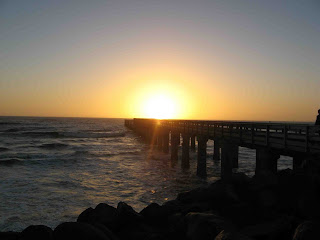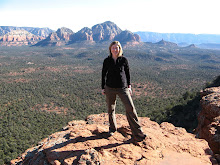Sunday 14 September 2008
Windhoek thoughts
As I waited for my food to arrive, I read the last few pages of my book - a travel log of a British reporter who followed the explorer Stanley's route across the Congo from Lake Tanganyika in the east to where the Congo River meets the Atlantic in the west. His experiences during the trip showed how once fairly developed towns/cities in the Congo had deteriorated into crime ridden, isolated outposts where no road or river navigation is now possible - an example of how some countries have actually "undeveloped" since independence from colonial governments in the face of widespread corruption, plundering and civil war. There are actually people in the Congo who say it was better under Belgian rule. Considering how brutal the Belgians were (cutting off people's hands if they didn't procure enough rubber to pay "tax"), you know things are really bad if the comparison is favorable. By contrast, traveling in Namibia is what I'd call Africa "light". Roads are in great condition, tourists can drink water from the tap in the main towns, no garbage or litter are on the streets, and you can drive safely all over the country without any issues. As I walked around today, I stopped into several South African and German chain stores, where you can buy anything from Italian coffee makers to the finest European towels and linens. I can buy Ritter Sport and Lindt chocolate in the Spar supermarket, which made me feel a little giddy after weeks on the farm. Right now I'm sitting in an internet cafe where I have a 100 MBps connection. This is not to say that all of this is affordable for the average Namibian, but the fact that it exists here shows a level of organization and infrastructure that simply doesn't exist in many other countries in the region (excluding South Africa, of course).
All that being said, there are major strides that need to be made in healthcare and education. The fact that Namibia has much higher rates of primary and secondary school enrollment than in many other parts of Africa should not be cause for celebration, as the common denominator is very low. Most teachers teaching in public schools don't have sufficient qualifications themselves, and, from what I've read, many either don't show up or may not present a lesson when they do. So, while attendance is high, the rate of passing grade level exams is dismal. I also heard from local Namibians that all of the mattresses in the main hospital were recently stolen, so, if you can't afford private care, you could end up laying directly on springs after having an operation. There's still a level of chaos even in this relatively well-to-do environment.
From my conversations with people on the farm and in Windhoek, I get the impression that many whites here use these as examples of why blacks are totally to blame for the fact that they earn only a small fraction of what an average white person does. One white Namibian guide who visited the farm expressed amazement that USAID and any other foreign aid agencies would invest development money here when it was so poorly managed by the government. His point of view was that he had worked for his money, and everyone should just have to "pull themselves up by their boot straps", as it were. We had a bit of a debate, as I argued that what he considered "big" aid money was, in fact, peanuts by European or US standards. Also, I pointed out that while he was at a German boarding school in Windhoek in the 50s and 60s, black Namibians didn't have access to public education. His point of view was that this was the government's problem, not his. I was heartened to hear the farm owner argue against this kind of thinking. He basically said - if you care about your country, don't you want it to be better? If the government isn't getting the job done, should those of us who have the resources and/or businesses just sit around and wait?
As I finished up my Kingclip dinner (delicious fish) and Caipirinha, I saw an advertisement on the television for a company who guaranteed to get you an American work visa. The words "American dream" scrolled across the screen as a busty blonde woman in a swimsuit seductively pulled herself out of a huge swimming pool. The ad ended with people partying on a boat near what looked like Miami. At best, this company was overpromising; at worst, they are ripping off Namibians who think they will soon be living large in the US. I guess it's true that everyone really wants the same thing.
Tuesday 9 September 2008
Last Day
Saturday 6 September 2008
Friday 5 September 2008
last days on the farm
detail work on the eyes and faces. I saw a woman teasing eyelashes on an ostrich head to make it look as realistic as possible. What a bizarre thing to do for a living! What was really interesting was looking at where the boxes were going to. The majority of boxes were being shipped to Texas (I won't go there!) and Wyoming, although I saw one being shipped to Wall Street. Some rich dude in NY is going to have a stuffed leopard or something in his office. I guess there's no accounting for taste.
Normally, this kind of thing is totally not my bag. I'm certainly no friend of the hunter - I just don't get why people like to kill things they aren't going to eat - but the fact that there is more wild game on private land than in national parks (excluding the Big 5) here speaks for itself. The saying among farmers here is "if it pays, it stays". In other words, the private land owners have been much better at managing wildlife effectively and generating jobs for local people. For example, a farmer might allow private game hunters to do limited trophy hunting, but he and every other farmer in the area have a huge incentive not to overhunt the Oryx or Kudu that the tourists come to see on game drives and to hunt, as it would reduce their business from year to year. So, if the balance is right, the farmer is incentivized to only use what's necessary and take steps to ensure proper game numbers. On the farm here, the meat is actually used to feed guests
and staff, and the hunters just get the trophies (there's no predator hunting on this particular farm). By the way, oryx steak is one of the most delicious meats I've ever tasted:)
Well, I am only on the farm for 5 more days, and then I take off on a 7 day trip to Etosha National Park (in the north) and Sossusvlei (southeast, desert area). After my quick trip to Swakopmund with the other volunteer, I got the travel bug again and realized I needed to explore a bit more than just the farm. It should be fun!
I'm off to teach kindergarten now. We are learning parts of the body today, and I'm just getting them to sing "head, shoulders, knees and toes" on their own. Super cute.


















